The New Joseph and the Unclean Spirit: Reflections on Lent Week III
by Borderland Nathan
Let’s look at both the Old Testament readings as well as Saint Paul from the new, before we look at the Gospel reading for today.
Genesis 37:2-28
2 Joseph, being seventeen years old, was shepherding the flock with his brothers; he was a lad with the sons of Bilhah and Zilpah, his father’s wives; and Joseph brought an ill report of them to their father. 3 Now Israel loved Joseph more than any other of his children, because he was the son of his old age; and he made him a long robe with sleeves. 4 But when his brothers saw that their father loved him more than all his brothers, they hated him, and could not speak peaceably to him. 5 Now Joseph had a dream, and when he told it to his brothers they only hated him the more. 6 He said to them, “Hear this dream which I have dreamed: 7 behold, we were binding sheaves in the field, and lo, my sheaf arose and stood upright; and behold, your sheaves gathered round it, and bowed down to my sheaf.” 8 His brothers said to him, “Are you indeed to reign over us? Or are you indeed to have dominion over us?” So they hated him yet more for his dreams and for his words. 9 Then he dreamed another dream, and told it to his brothers, and said, “Behold, I have dreamed another dream; and behold, the sun, the moon, and eleven stars were bowing down to me.” 10 But when he told it to his father and to his brothers, his father rebuked him, and said to him, “What is this dream that you have dreamed? Shall I and your mother and your brothers indeed come to bow ourselves to the ground before you?” 11 And his brothers were jealous of him, but his father kept the saying in mind.
12 Now his brothers went to pasture their father’s flock near Shechem. 13 And Israel said to Joseph, “Are not your brothers pasturing the flock at Shechem? Come, I will send you to them.” And he said to him, “Here I am.” 14 So he said to him, “Go now, see if it is well with your brothers, and with the flock; and bring me word again.” So he sent him from the valley of Hebron, and he came to Shechem. 15 And a man found him wandering in the fields; and the man asked him, “What are you seeking?” 16 “I am seeking my brothers,” he said, “tell me, I pray you, where they are pasturing the flock.” 17 And the man said, “They have gone away, for I heard them say, ‘Let us go to Dothan.’” So Joseph went after his brothers, and found them at Dothan. 18 They saw him afar off, and before he came near to them they conspired against him to kill him. 19 They said to one another, “Here comes this dreamer. 20 Come now, let us kill him and throw him into one of the pits; then we shall say that a wild beast has devoured him, and we shall see what will become of his dreams.” 21 But when Reuben heard it, he delivered him out of their hands, saying, “Let us not take his life.” 22 And Reuben said to them, “Shed no blood; cast him into this pit here in the wilderness, but lay no hand upon him”—that he might rescue him out of their hand, to restore him to his father. 23 So when Joseph came to his brothers, they stripped him of his robe, the long robe with sleeves that he wore; 24 and they took him and cast him into a pit. The pit was empty, there was no water in it.
25 Then they sat down to eat; and looking up they saw a caravan of Ish′maelites coming from Gilead, with their camels bearing gum, balm, and myrrh, on their way to carry it down to Egypt. 26 Then Judah said to his brothers, “What profit is it if we slay our brother and conceal his blood? 27 Come, let us sell him to the Ish′maelites, and let not our hand be upon him, for he is our brother, our own flesh.” And his brothers heeded him. 28 Then Mid′ianite traders passed by; and they drew Joseph up and lifted him out of the pit, and sold him to the Ish′maelites for twenty shekels of silver; and they took Joseph to Egypt.
And now the reading of Saint Paul as a point of contrast.
Ephesians 5:1-9
5 Therefore be imitators of God, as beloved children. 2 And walk in love, as Christ loved us and gave himself up for us, a fragrant offering and sacrifice to God. 3 But immorality and all impurity or covetousness must not even be named among you, as is fitting among saints. 4 Let there be no filthiness, nor silly talk, nor levity, which are not fitting; but instead let there be thanksgiving. 5 Be sure of this, that no immoral or impure man, or one who is covetous (that is, an idolater), has any inheritance in the kingdom of Christ and of God. 6 Let no one deceive you with empty words, for it is because of these things that the wrath of God comes upon the sons of disobedience. 7 Therefore do not associate with them, 8 for once you were darkness, but now you are light in the Lord; walk as children of light 9 (for the fruit of light is found in all that is good and right and true).
The liturgy, or worship, of the Church places these readings together in the Divine Office as well as the Mass so that we are able to interpret the passages according to the heart of the Church. Joseph is understood to be an imperfect type that finds his fulfillment in Christ. And yet this style of reading, known as typology, can sometimes seemed far fetched. And yet the Jews themselves presented King David as a new Joseph, and King David himself would find his fullness, along with the fulfillment of the Abrahamic promises, in Jesus.
There are only two places in Scripture other than for Jesus where the age is given as 30 years old, for Joseph and for David. The Gospel of Luke does this for Jesus as well, and in all three cases the age is given at the start of public service. For Joseph when working in the house of Pharaoh, for David as he begins to rule over Israel and Judah, and for Jesus as he begins to spread the Kingdom.1)James M. Hamilton, “Was Joseph a Type of the Messiah? Tracing the Typological Identification between Joseph, David, and Jesus,” Southern Baptist Journal of Theology 12 (2008): 52-57.
Both Joseph and Jesus were sold for shekels of silver, and were betrayed by their own. The Church fathers saw an allegory of the Jews betraying Jesus in the same way that Joseph’s brothers, who represented the twelve tribes of Israel, betrayed him. Just as Joseph was sold into the hands of Ishmaelite-Midianite traders, so the nations rose up against Jesus.2)Acts 4:25–27; cf. Ps 2:1–2. Joseph’s coat was torn off his body, as was Jesus’s seamless robe, and there are many, many more parallels.
One of the fathers, Saint Chromatius of Aquileia, pointed out this interpretation of the spices carried by the trade caravan that purchased Joseph:
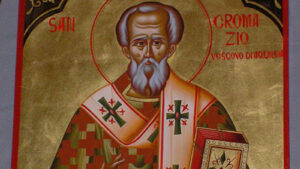
Saint Chromatius of Aquileia, 4th century AD-406 AD
“Joseph was rejected by his brothers and was received by the Ishmaelites; in the same manner our Lord and Savior was rejected by the Jews and received by the pagans. The Ishmaelites who received Joseph carried along with them all kinds of perfumes, and this fact showed that the pagans by embracing the faith would spread the different perfumes of justice all over the world.”3)Chromatius, quoted in Genesis 12–50, ed. Mark Sheridan, Ancient Christian Commentary on Scripture, Old Testament 2 (Downers Grove, IL: InterVarsity Press, 2002), 238.
Initially this may seem like a fanciful stretch of interpretation, but if we look again at verse two of Saint Paul’s passage, what do we see? “And walk in love, as Christ loved us and gave himself up for us, a fragrant offering and sacrifice to God.” Jesus is tied with images of frankincense and myrrh, both with the maggi as well as burial spices, and can be thought of as quite literally a fragrant offering. This is seen in the incense and sweet spices within the Tabernacle in Exodus 30:7-9, 34-38, which was placed next to and “carried up” the burnt offering. Likewise we are meant to be fragrant sacrifices united with Christ, as can be seen symbolically in Revelation 8:3-4, where the incense mingles with the prayers of the saints at the altar in heaven. The readings of the liturgy and the tradition and heart of the Church provide the guard rails that allow such poetic interpretation to bring truth instead of just imaginative readings. It allows us to learn the authentic language of Christian symbolism. God writes poetry with human events, if we have the sacramental eyes to see.
Fathers such as Caesarius of Arles were quick to point out that the dream by Joseph could not be purely about himself and his family, but pointed toward a future fulfillment. This is common throughout the Old Testament, as the promises of Abraham often point forward to a greater fulfillment in his children, and ultimately the Messiah. One immediate example of why is that the part of Joseph’s dream where his father and mother were to bow down to him is impossible, since his mother was already dead. Further, the idea of the father and mother in Near Eastern culture bowing down to their son would be astonishing in itself. Saints Ambrose and Caesarius both saw this interpretation as being necessarily fulfilled in Christ, but more importantly Saint Ambrose saw this as applying specifically to Jesus’s reception by the Jews.
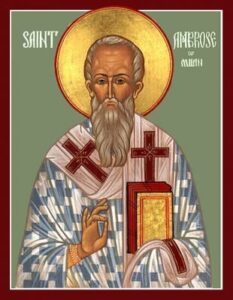
Saint Ambrose of Milan, 340 AD – 397 AD
“On this account his father reproved him and said, ‘What will be the meaning of this vision that you have dreamed? Can it be that I and your mother and your brothers will come and bow to the ground before you?’ Who is he before whom parents and brothers bowed down to the ground but Jesus Christ? Joseph and his mother with the disciples bowed down before him and confessed the true God in that body, of whom alone it was said, ‘Praise him, sun and moon; praise him, all you stars and light.’ Further, what is the meaning of the father’s reproach but the hardness of the people of Israel? Christ comes from them according to the flesh, but today they do not believe that he is God and are not willing to bow down to him as their Lord, because they know that he was born from among themselves. Accordingly they hear his replies, but they do not understand them. They themselves read that the sun and moon praise Christ, but they are unwilling to believe this was said with reference to Christ. Therefore Jacob is mistaken in regard to the symbol, which refers to another, but is not mistaken in the love, which is his own. In him paternal love did not go astray, but rather there is depicted an affection for a people that was going to go astray.”4)Ambrose, quoted in Genesis 12–50, ed. Mark Sheridan, Ancient Christian Commentary on Scripture, Old Testament 2 (Downers Grove, IL: InterVarsity Press, 2002), 234.
This brings us to the passage from the Gospel, where Jesus faces opposition from some of the Jews.
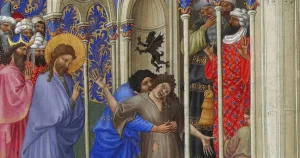
Luke 11:14-28
14 Now he was casting out a demon that was dumb; when the demon had gone out, the dumb man spoke, and the people marveled. 15 But some of them said, “He casts out demons by Be-el′zebul, the prince of demons”; 16 while others, to test him, sought from him a sign from heaven. 17 But he, knowing their thoughts, said to them, “Every kingdom divided against itself is laid waste, and house falls upon house. 18 And if Satan also is divided against himself, how will his kingdom stand? For you say that I cast out demons by Be-el′zebul. 19 And if I cast out demons by Be-el′zebul, by whom do your sons cast them out? Therefore they shall be your judges. 20 But if it is by the finger of God that I cast out demons, then the kingdom of God has come upon you. 21 When a strong man, fully armed, guards his own palace, his goods are in peace; 22 but when one stronger than he assails him and overcomes him, he takes away his armor in which he trusted, and divides his spoil. 23 He who is not with me is against me, and he who does not gather with me scatters. 24 “When the unclean spirit has gone out of a man, he passes through waterless places seeking rest; and finding none he says, ‘I will return to my house from which I came.’ 25 And when he comes he finds it swept and put in order. 26 Then he goes and brings seven other spirits more evil than himself, and they enter and dwell there; and the last state of that man becomes worse than the first.” 27 As he said this, a woman in the crowd raised her voice and said to him, “Blessed is the womb that bore you, and the breasts that you sucked!” 28 But he said, “Blessed rather are those who hear the word of God and keep it!”
Jesus is accused of using the leader of demons to cast out demons, and first demonstrates how that is illogical. We see here that just as Joseph was not accepted by his kin, the future representatives of the twelve tribes of Israel, Jesus is accused of being not with God, but the Devil. Further, he critiques the ineffectual exorcisms of the Jewish exorcists by accusing them of being a strong man that is defeated by a stronger man.
There have been a few different interpretations by the fathers of the story of the unclean spirit, and they are helpful and correct. However, the more literal interpretation is to view the story of the unclean spirit as part of one large chunk, where Jesus continues his explanation of how retarded the pharisees are. He didn’t just feel the need to stop at a logical statement; he went into story mode.
In this story, he is telling about what an unclean spirit does, and contrasting it with the ineffective exorcisms of the Jews, to ultimately contrast their exorcisms with his own exorcisms. The Jewish exorcists create order, and the unclean spirit seeks rest by looking for someone to destroy. Destruction and filth is what a demon’s “rest” looks like. Not only does the demon seek to undo what the exorcist has done, it seeks to undo it completely, with seven other spirits. Seven is a covenantal number which in this case signifies an allegiance to a force that is evil, and the complete opposite of the work the exorcist has done by exorcising the man. But notice that the Jewish exorcism is not powerful enough to maintain the state of order, nor is it powerful enough to prevent a “stronger man” from coming in the form of seven more spirits. Their “house” cannot stand, because they are not with Jesus, and therefore not with God. This further solidifies Jesus’s earlier point that what he does must be by the finger of God, since it cannot be by Beelzebul, but it also points out the incomparable difference between his exorcisms and the ones that came before him.5)John J. Kilgallen, “The Return of the Unclean Spirit (Luke 11,24-26),” Biblica 74, no. 1 (1993): 57-58, and Bart B. Bruehler, “Jesus’s Self-Defense in Luke 11:14–26: Confounding Challengers and Critiquing Other Exorcists,” The Catholic Biblical Quarterly 85, no. 2 (April 2023): 297-314.

Moral Meaning
In our walk through Lent, we are meant to be a people set apart, and that doesn’t always mesh well with the surrounding culture. Fasting and prayer can be inconvenient and even seen as antisocial, and peer pressure can affect you. Anyone that has ever tried to quit drinking is aware of what this is like; you have to find a whole new friend group that won’t actively try to induct you back into their sewer rat lifestyle. Irish, and out here Mexican and Navajo culture are similar; alcohol is everywhere and people are too quick to make it an issue of family vs obligations to God.
“Come on, bro, God won’t care if you have a drink with your family.”
“Fuck off, Steve.”
Sometimes family are like crabs in a bucket. If you’ve ever grown up in the hood I’m sure you’ve seen this as well. Regarding crabs, fisherman would put crabs in a bucket and never bother to actually cover the bucket, because there was no need. As soon as one crab started to crawl to the top, another crab would pull it by the leg back into the bucket. People are not very understanding if they think you are trying to better yourself and become more holy. The downside about being a light to others, is that sometimes that same light creates a brighter contrast on the darkness in others. People don’t like being reminded of their own sin, and so they will tear you down so they don’t have to feel bad. They will try their best to make you just like them.

Drunks don’t like you to be sober because then it means they can be sober too. They like to live the lie instead. But it needn’t be such a dramatic example. Something as simple as fasting or needing to complete your scheduled prayer time can make it seem like you aren’t taking part in the social life of your friends and family. I fast all day and eat once at 3pm. Most people eat after this, and I can only have water, and no meat. I had to forego a friend’s barbecue that was coming into town for that same reason. He knows I’m Catholic, and he was only coming in town for a couple days to have a barbecue that he must have known I couldn’t partake in. People will test you in stupid ways, and it’s important to stay strong and be a fragrant sacrifice for God. Don’t have your house in order and let seven more demons, even worse, back into your life. These same people won’t be there when you die. Associate with those that are on board with the kind of life you want, so you can have the kind of death you want. I leave you with Origen and the Venerable Bede.
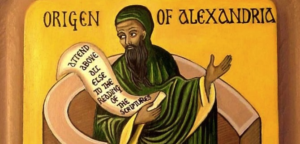
Origen of Alexandria, 185 AD – 254 AD
“The unclean spirit dwelt in us before we believed, before we came to Christ when our soul was still committing fornication against God and was with its lovers, the demons. Afterward it said, ‘I will return to my first husband,’ and came to Christ, who ‘created’ it from the beginning ‘in his image.’ Necessarily the adulterous spirit gave up his place when it saw the legitimate husband. Christ received us, and our house has been “cleansed” from its former sins. It has been ‘furnished’ with the furnishing of the sacraments of the faithful that they who have been initiated know. This house does not deserve to have Christ as its resident immediately unless its life and conduct are so holy, pure and incapable of being defiled that it deserves to be the ‘temple of God.’ It should not still be a house, but a temple in which God dwells. If it neglects the grace that was received and entangles itself in secular affairs, immediately that unclean spirit returns and claims the vacant house for itself. ‘It brings with it seven other spirits more wicked,’ so that it may not be able again to be expelled, ‘and the last state of that kind of person is worse than the first.’ It would be more tolerable that the soul would not have returned to its first husband once it became a prostitute than having gone back after confession to her husband, to have become an adulteress again. There is no ‘fellowship,’ as the apostle says, ‘between the temple of God and idols,’ no ‘agreement between Christ and Belial.’”6)Origen, quoted in Luke, ed. Arthur A. Just Jr., Ancient Christian Commentary on Scripture, New Testament III (Downers Grove, IL: InterVarsity Press, 2003), 194.
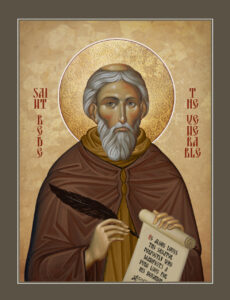
Saint Bede the Venerable, 672 AD – 735 AD
“And here we must beware lest the sin which we supposed extinguished in us, by our neglect overcome us unawares. But he finds his house swept and garnished, that is, purified by the grace of baptism from the stain of sin, yet replenished with no diligence in good works. By the seven evil spirits which he takes to himself, he signifies all the vices. And they are called more wicked, because he will have not only those vices which are opposed to the seven spiritual virtues, but also by his hypocrisy he will pretend to have the virtues themselves.”7)Bede, quoted in Thomas Aquinas, Catena Aurea: Commentary on the Four Gospels, Collected out of the Works of the Fathers, vol. 3, pt. 1, St. Luke (Oxford: John Henry Parker, 1842; repr., Albany, NY: Preserving Christian Publications, 1995), 408.
References

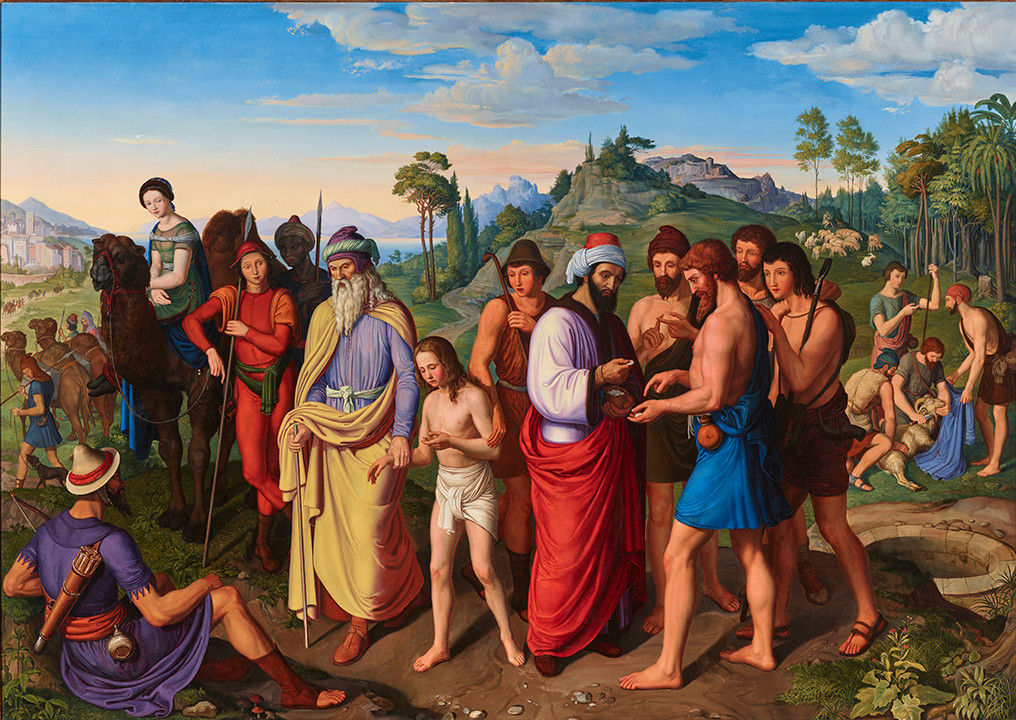
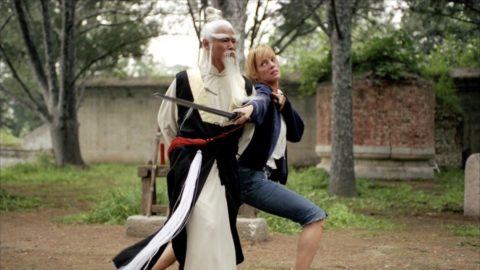
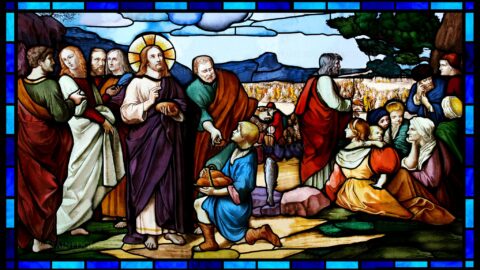
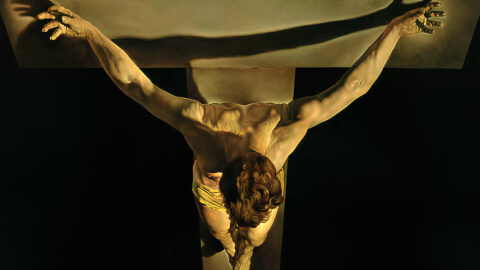


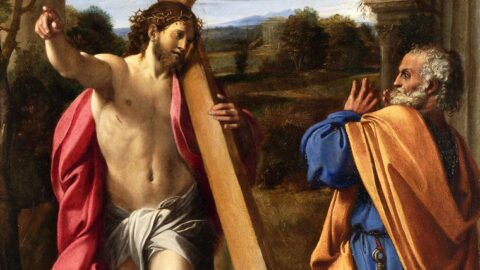
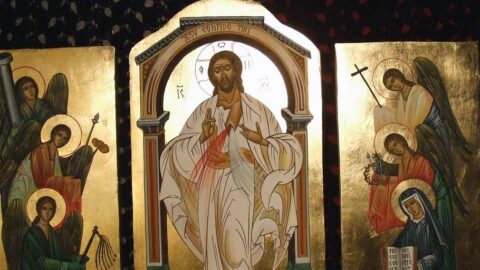
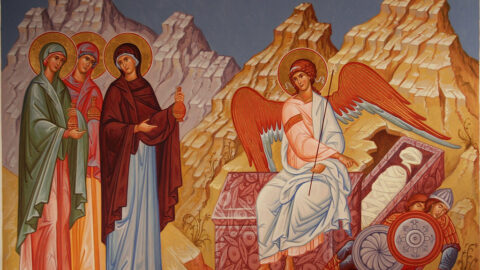
 Rob Brotzman
Rob Brotzman  Nathan Wagar
Nathan Wagar